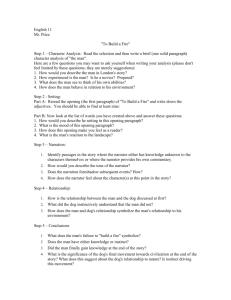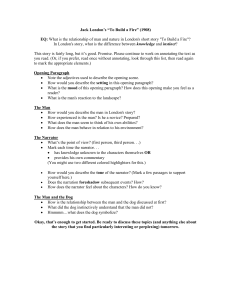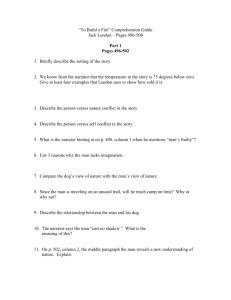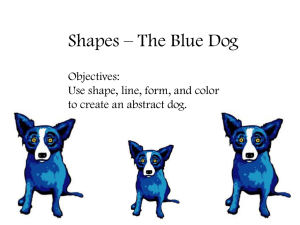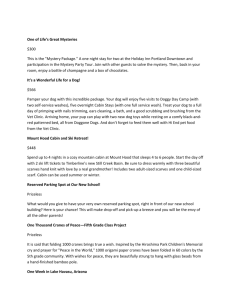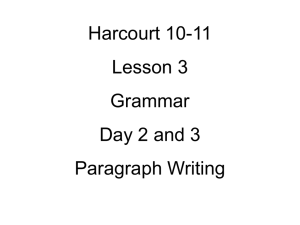Book 2(Lesson 1)
advertisement
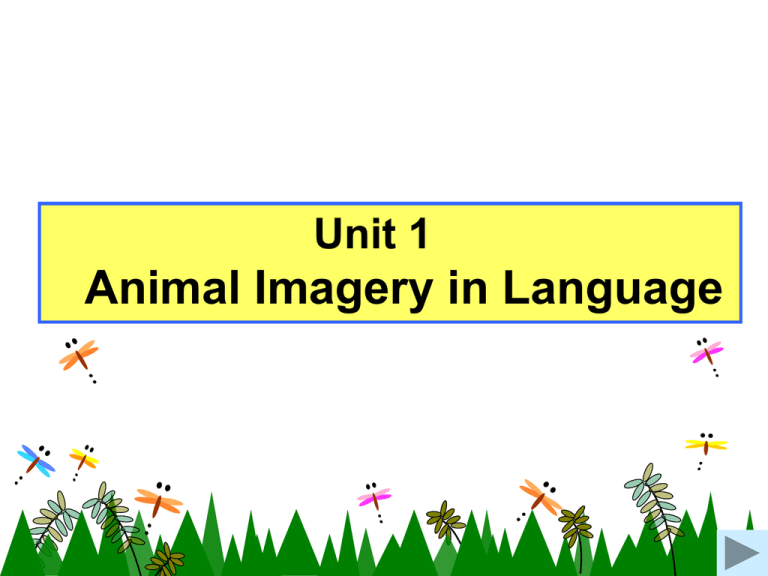
Unit 1 Animal Imagery in Language Paragraph 1: . . . certain animals seem to have . . . . . . it seems that certain animals have specific characteristics. As . . . , and cranes are said to symbolize . . . as conj. 如同…一樣 Do in Rome as the Romans do. ( 入境問俗 ) . . . cranes are said to symbolize . . . . . . it is said that cranes symbolize long life. N is (are) said to V =It is said that N Vs is/are It is said/believed + (that) S + (that) S + V . . . was/were/V-ed . . . S + be said/believed + to be/V/have Ven . . . Paragraph 2: as quiet as a mouse 非常地安靜 My brother has been as quiet as a mouse since he came home last night. as poor as a church mouse 非常地貧窮 N + be used to + V ( 被用來 ) However, if . . . , an elephant would be . . . however adv. 然而,不過 It was raining. However, we still went shopping. 此為if引導的條件句,would在這裡有 「就…」的意思,而非助動詞過去式。 As a result, a teacher may say, “The students are . . . like a herd of elephants” . . . as a result 因此 = therefore = consequently = as a consequence = hence a herd of表示「一群」,特指牛或馬 等 What’s more, if a person . . . , it means . . . 在此句中,if是表示某個條件,前提成立 的情況下,就會有怎樣的結果,故主要子 句動詞用簡單式即可。如: If you throw a stone into the lake, it sinks. Paragraph 3 another elephant-related expression = another expression which is related to elephants N + -related表示「和…有關的」, 例如:animal-related、 family-related、 culture-related、 pollutionrelated、 Originally, “jumbo” was the word for “elephant” in an African language. A is the word for B A is taken as B (被當作) since conj. 由於,因為 more and more 越來越多… . . . has come to share the meaning . . . come to do something 開始(做某事) After having lived in Taiwan for 15 years, the foreigner came to think of himself as a Taiwanese. 與cat相關的用語或諺語有: let the cat out of the bag 洩露祕密 fight like cat and dog 激烈地爭鬥、吵架等 rain cats and dogs 下傾盆大雨 A cat has nine lives. 貓有九條命。(生命力強) 與dog相關的用語或諺語有: not have a dog’s chance 機會渺茫 lead/live a dog’s life 悲慘的生活 dog eat dog 競爭激烈 a dog in the manger 占著茅坑不拉屎的人 Love me, love my dog. 愛屋及烏。 與sheep、lion、lamb相關的用語或諺語有: a wolf in sheep’s clothing 披著羊皮的狼(偽善者) like sheep 盲從者 a lamb to the slaughter 羊入虎口 the lion’s share 最大、最好的一份 Paragraph 4: . . . gives others the impression that . . . give sb an impression 給某人印象 make an impression on sb that為關係代名詞,引導後面的名詞 子句修飾先行詞impression。 When you call . . . , you mean that the person . . . call A B that所引導的名詞子句做及物動詞 mean的受詞。 . . . is always working or busy with something . . . be + always + V-ing 表示「反覆出現或習慣 性的動作」,有時也含有抱怨的語氣。 Sam is always boasting about how smart he is. be busy with + N/(in +) V-ing 忙於(做某事) Jason is busy with/(in) doing his homework. Paragraph 5: aside from = besides (包括在內 ) = except ( 不包括在內 ) many sayings that . . . make English an interesting language . . . make + O + OC (N/adj.) Ms. Lee’s patience makes her a good teacher. The good news made us happy. . . . plays a part in different languages. play a part/role in sth 對某事物發揮作 用 To many people, religion plays a part in helping them find peace of mind. It not only . . . , but also . . . not only A but also B是「不僅…還…」的 意思。 因not only . . . but also . . . 為對等連接詞, 故A、B必需為相同的文法結構。當A、B 為主詞時,動詞變化與B一致。如: Not only you but also James likes to go hiking.
